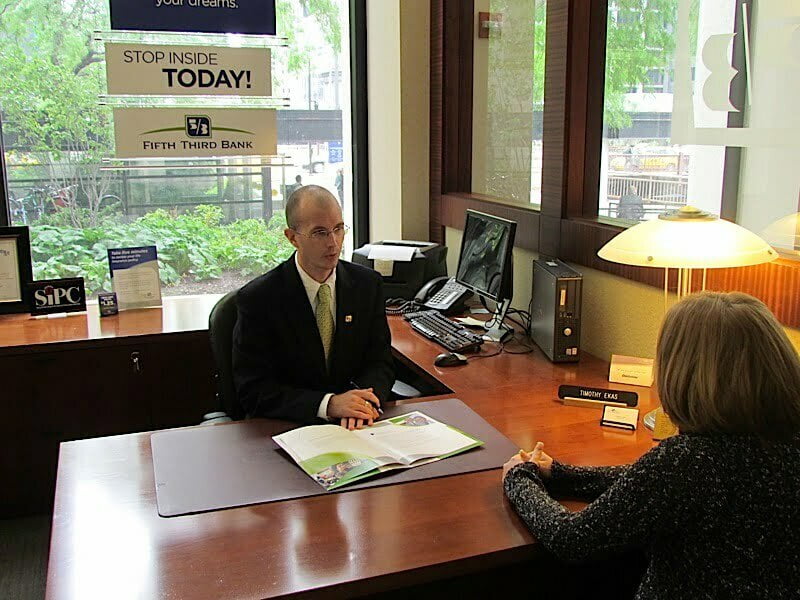by Rick A. Richards
Northwest Indiana bankers say their business is different–a lot different–than a year ago.
Banking has seen a lot of change, nearly all of it driven by legislative reform as a result of the mortgage meltdown that threw the nation's economy into a tailspin. Not one region bank was involved in sub-prime lending, but all are affected by new laws that have imposed thousands of pages of new compliance and accounting rules.
Craig Pratt, senior vice president of the greater Chicago region for Fifth Third Bank, says that when the Dodd-Frank Act was passed by Congress creating tougher oversight on banks, institutions that weren't involved in sub-prime lending also were affected.
“The revenue pieces are hurting us,” says Pratt, explaining that Dodd-Frank forced banks to pay closer attention to their bottom line. Pratt says it's not as if banks weren't paying attention, but now regulators are more closely scrutinizing individual loans and business practices.
The new rules even regulate the amount of money banks can charge each other for processing ATM and debit card transactions, and Pratt says what's allowed doesn't cover the cost of the transaction. “We're not at the point where we could charge customers to use their debit cards but some banks are experimenting with it,” says Pratt.
“People have to understand that there is a cost in doing business this way. There are processing fees for each transaction and right now we're not covering the cost of the transactions with what we charge out-of-network customers.”
Craig Dwight, chairman and CEO of Horizon Bank in Michigan City, admits to some frustration over the changes.
“With the compliance rules we have for labor, for OSHA and now with Dodd-Frank, there is a big cost involved. Just to make all of our ATMs compliant with ADA will cost us $300,000,” says Dwight. He says the bank would prefer to make the change as an ATM becomes obsolete, but the government has mandated immediate change.
“For us, just to comply with the banking changes in Dodd-Frank, we need full-time compliance people to keep up with the rules. The paperwork is a nightmare,” says Dwight. “The mortgage side has seen the most change.” Under Dodd-Frank, all mortgage officers have to be licensed and the cost to Horizon for that is $15,000 a year.
“What's the benefit of that?” asks Dwight. “There were existing rules in place to take care of all the issues but they weren't used.”
The goal is to make sure banks write good loans, but Dwight says that's something Horizon was doing. “We have an incentive to make good loans. We have to make sure the borrower has the ability to repay.”
Michele Thompson, president of LaPorte Savings Bank, says that even though it did not participate in sub-prime lending, the bank is feeling the impact.
“There is always some negative when the pendulum swings like this in Congress, but you have to find the positive in it,” says Thompson.
“We had to add the equivalent of one new full-time employee in compliance to meet the new rules. We're also trying to do more with the same amount of people in other areas. There is some frustration over accounting changes and there are some new regulations coming down hard on loans,” says Thompson. “That makes us think harder about the loans we make. We need to be sure they are quality loans.”
In the nearly 30 years Thompson has been in banking, she's seen a lot of change, but she says what's happening now is more comprehensive than in the past.
“I think banking is just as challenging today as when I first got into it,” says Thompson. “It's not quite as much fun, but these kinds of pendulum swings are something we've gotten used to. This one happens to be one of the more extreme. If you like change, then you'll like being in banking.”
Christopher Murphy, chairman, president and CEO of 1st Source Bank in South Bend, says larger banks are better equipped to handle the new rules because they have the resources to handle them. “It means we have to spend more money, energy and time in order to comply.”
Murphy says, “What we're seeing is episodic legislation. It's not well thought out, but it's done so legislators can show their constituents that they're doing something. It's costing us between $3 million and $5 million in regulatory compliance.”
Murphy has been through change before but says these regulations have created another layer of bureaucracy between banks and customers. “I love serving clients. It's wonderful to serve the community, but I don't see small banks being able to survive in this climate. I don't think you can be a $100 million community bank and be able to afford the new regulations being imposed. Congress wouldn't have to pass another law for 10 years and we'd still have more than enough regulation.”
At Citizens Financial Bank in Munster, Chairman and CEO Thomas Prisby and President Darrell Pomranke agree that the changes affect how the bank works with customers. “We're more proactive in dealing with clients now,” says Prisby. “When payments aren't on time, we don't wait 30 days. We reach out at 15 days to try to let them know we're also financial advisers who can help them.”
Prisby says Dodd-Frank “has raised our sensibilities.”
Pomranke says the bank is doing more investor presentations to let clients know about the regulatory changes. “I don't know that we could do much more than we're doing already. I feel we're a very active participant in our community.”
Pomranke says the key to making good loans is making sure of the character of the borrower. “We spend a lot of time analyzing what is a good lending relationship. We think we know our community better than the regulators. We simply have to work diligently with clients and explain the new regulations.”
However, Pomranke says the real challenge is yet to come. “There are 4,500 pages of regulations now, but that's leading to probably another 30,000 pages that are still being written. Small banks are the ones who are going to pay for the new compliance rules because of the sins of the big banks. I think you're going to see the use of more outside third parties taking over compliance for smaller banks because they simply don't have the staff to handle it.”
In the 27 years Rob Gardiner has been in banking, he's seen a lot of change. But the president of First Midwest Bank in Highland says he's seen nothing on the scope of Dodd-Frank to tighten banking oversight.
“It was recognition that the public wanted more accountability,” says Gardiner. “The problem is the law was passed and then they started writing the regulations; some of them have yet to be written.”
Says Gardiner, “Regulation costs money, but today it's just part of the cost of doing business.” He says that while he understands why things have happened, the reality is that “banks are most valuable in the absence of change, and we have seen a lot of financial change lately.”
Gardiner says it's still fun to be a banker. “The fun days are days you can work with customers and provide them with what they need. You have to hear your customers and respond to them. We all have a range of products and you have to figure out how to differentiate yourself in offering them.”
David Bochnowski, chairman and CEO of Peoples Bank in Munster, says his biggest concern is that many of Dodd-Frank's regulations are still being written.
“What are those regulations? We're still waiting,” says Bochnowski, adding that the major sub-prime offenders were not banks and weren't regulated.
Banks, says Bochnowski, are becoming more robust in their risk-management practices. “The new growth area for Peoples is compliance. We're increasing our efforts there. Instead of adding loan officers that would generate revenue, we're adding risk officers.”
Even so, Bochnowski says banking remains fun. “We're faced with dealing with Congress, which is the most reactive body in the world. There were already rules in place to handle the problems, but they chose to create new ones.”
David Harvey, northern Indiana regional president for First Financial Bank, says the new rules “are going to affect the industry more than we see now. There is going to be a significant legal and regulatory impact.”
First Financial Bank has the resources to deal with the impact, but Harvey says smaller community banks will have difficulty dealing with the increased cost of compliance.
“The banking industry was painted with a broad brush by Congress. They treated us all alike, but a lot of the local banks weren't involved with sub-prime lending and shouldn't have been treated like that. They're the ones paying the price.”
“Things are a lot different today than they were when I got into the business in 1982,” says Harvey. “Used to be, you could make a deal on a handshake; we don't do that anymore.
“The fun part for me is when you have an opportunity to go out on business calls and kick the tires. It's fun when you help someone reach their dream,” says Harvey. “The tools in the toolbox are different today. My job is to figure out ways to get the job done.”




